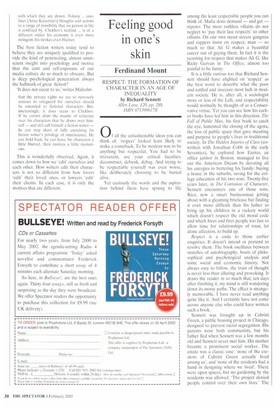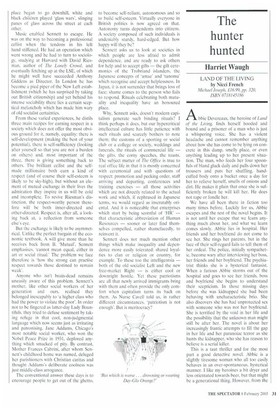among the least respectable people you can think of. Mafia
dons demand — and get — rispetto. The most ruthless villains do not neglect to 'pay their last respects' to other villains. On our own mean streets gangstas and rappers insist on respect, man — so much so that Ali G makes a beautiful career out of guying them. In fact it is the yearning for respect that makes Ali G, like Ricky Gervais in The Office, almost too painful to be funny.
It is a little curious too that Richard Sennett should have alighted on 'respect' as the best word to describe what the poor and rattled and insecure most lack in modern society. He is, after all, a sociologist more or less of the Left, and respectability would normally be thought of as a Conservative virtue. Yet you can sec how his earlier books have led him in this direction. The Fall of Public Man, his first book to catch the eye, lamented the closing of the agora, the loss of public space that gave meaning and purpose to people's lives in traditional society. In The Hidden Injuries of Class (cowritten with Jonathan Cobb in the early Seventies), he explored how Enrico, an office janitor in Boston, managed to live out the American Dream by devoting all his energies to bettering his family: buying a house in the suburbs, saving for the college education of his two sons. Twenty-five years later, in The Corrosion of Character, Sennett encounters one of those sons, Rico, now a smart businessman jetting about with a gleaming briefcase but finding it even more difficult than his father to bring up his children in a rackety world which doesn't respect the old moral code and which hires and fires people too fast to allow time for relationships of trust, let alone affection, to build up.
Respect is a coda to those earlier enquiries. It doesn't intend or pretend to resolve them. The book oscillates between snatches of autobiography, bouts of philosophical and psychological analysis and some social and economic history. Not always easy to follow, the train of thought is never less than alluring and provoking. It draws the reader in so much that, ten days after finishing it, my mind is still wandering down its mossy paths. The effect is strangely memorable. I have never read anything quite like it. And I certainly have not come across anyone else who could have written such a book.
Sennett was brought up in Cabrini Green, a public housing project in Chicago, designed to prevent racial segregation. His parents were both communists, but his father fled when Sennett was a few months old and Sennett never met him. His mother became a prominent social worker. The estate was a classic case: 'none of the creators of Cabrini Green actually lived among us', and 'none of the residents had a hand in designing where we lived'. There were open spaces, but no gardening by the residents was allowed. The project denied people control over their own lives.' The
place began to go downhill, white and black children played 'glass wars', slinging panes of glass across the street at each other.
Music enabled Sennett to escape. He was on the way to becoming a professional cellist when the tendons in his left hand stiffened. He had an operation which went wrong and he had to turn to sociology, studying at Harvard with David Riesman. author of The Lonely Crowd, and eventually fetching up at the LSE, of which he might well have succeeded Anthony Giddens as Director. In London he has become a pied piper of the New Left establishment (which he has surprised by taking out British citizenship) and yet behind his intense sociability there lies a certain sceptical melancholy which has made him wary of old socialist certainties.
From these varied experiences, he distils three main recipes for earning respect in a society which does not offer the most obvious ground for it, namely, equality: there is self-development (making the best of your potential), there is self-sufficiency (looking after yourself so that you are not a burden on others) and, most important of the three, there is giving something back to others. The brilliant cellist and the selfmade millionaire both earn a kind of respect (and of course their self-esteem is likely to be sky-high), but without an element of mutual exchange in their lives the admiration they inspire in us will be cold and incomplete. To revive Riesman's distinction, the respect-worthy person therefore will be both inner-directed and other-directed. Respect is, after all, a looking back at, a reflection from someone else's eye.
But the exchange is likely to be asymmetrical. Unlike the perfect bargain of the economic textbook, A will give more than he receives back from B. 'Mutual', •Sennett emphasises, 'cannot mean equal, either in art or social ritual.' The problem we face therefore is 'how the strong can practise respect towards those destined to remain weak'.
Anyone who isn't brain-dead remains uneasily aware of this problem. Sennett's mother, like other social workers of her generation and ours, realised they belonged inescapably to 'a higher class who had the power to violate the poor'. In order not to be fingered as latter-day Lady Bonntifuls, they tried to defuse sentiment by taking refuge in that cool, non-judgmental language which now seems just as irritating and patronising. Jane Addams, Chicago's most notable social worker, who won the Nobel Peace Prize in 1931, deplored anything which smacked of pity. By contrast, Mother Frances Cabrini, after whom Sennett's childhood home was named, deluged her parishioners with Christian caritas and thought Addams's deliberate coolness was just middle-class arrogance.
The conventional answer these days is to encourage people to get out of the ghetto, to become self-reliant, autonomous and so to build self-esteem. Virtually everyone in British politics is now agreed on that. Autonomy turns dependents into citizens. A society composed of such individuals is undeniably sturdy, hard-edged. But how happy will they be?
Sennett asks us to look at societies in which people are less afraid to admit dependence, and are ready to ask others for help and to accept gifts — the gift ceremonies of the Trobriand islanders, the Japanese concepts of 'amae' and 'tanomu' which recognise and accept helplessness. In Japan, it is not surrender that brings loss of face; shame comes to the person who fails to respond. Rituals celebrating both mutupalliatcy e. and inequality have an honoured
Why, Sennett asks, doesn't modern capitalism generate such binding rituals? I think perhaps it does, but our hypercritical intellectual culture has little patience with such rituals and scarcely bothers to note them; the customs of a sporting or social club or a college or society, weddings and funerals, the rituals of commercial life — the gifts, the corny speeches, the toasts. The subject matter of The Office is true to real office life in that it is mostly concerned with ceremonial and with questions of respect: promotion and pecking order, staff arriving and departing, conferences and training exercises — all those activities which are not directly related to the actual work and which, if rephrased in Japanese terms, we would regard as inscrutably oriental. And it is noticeable that enterprises which start by being scornful of 'HR — that characteristic abbreviation of Human Resources — sooner or later find themselves compelled, rather shamefacedly, to reinvent it.
Sennett does not much mention other things which make inequality and dependence more easily tolerated: shared loyalties to clan or religion or country, for example. To these too the intelligentsia — both of the old socialist Left and the new free-market Right — is either cool or downright hostile. Yet these patriotisms are all that newly arrived immigrants bring with them and often provide the only comfort when capitalism turns its back on them. As Nurse Cavell told us, in rather different circumstances, 'patriotism is not enough'. But is meritocracy?



























































 Previous page
Previous page